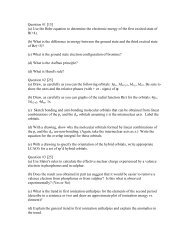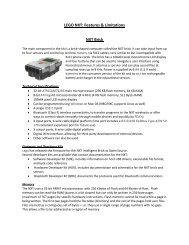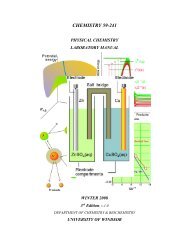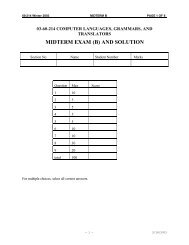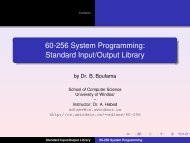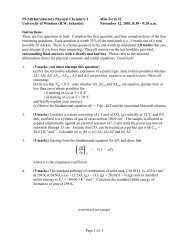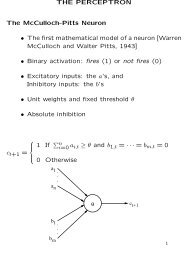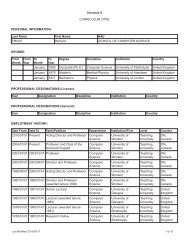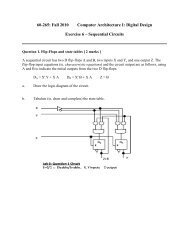Adjectives: A Uniform Semantic Approach - University of Windsor
Adjectives: A Uniform Semantic Approach - University of Windsor
Adjectives: A Uniform Semantic Approach - University of Windsor
Create successful ePaper yourself
Turn your PDF publications into a flip-book with our unique Google optimized e-Paper software.
340 N. Abdullah and R.A. Frost<br />
• Finally, this approach shows promising results in accommodating modal<br />
adjectives, e.g. ‘possible’, ‘potential’, ‘alleged’, etc. This type <strong>of</strong> adjectives has<br />
proved to be difficult to account for without resorting to approaches such as modal<br />
logics, which are not readily mapped into computer programs. For example, the<br />
sentence John is an alleged criminal can be represented as follows:<br />
Criminal= {j: criminal :┴}: criminal where j = ||John||<br />
Alleged= {j: criminal: ┴}:┴.<br />
The symbol “┴” represents the absurd type, i.e. the subtype <strong>of</strong> every type. In the<br />
set Criminal, above, we want to indicate that John may or may not end up a member<br />
<strong>of</strong> it. Thus, by indicating that j is <strong>of</strong> type “┴” we mean to capture john’s partial<br />
membership in the set Criminal. Note that the above representation blocks all invalid<br />
inferences. For example, the answer to the query, “Is John a criminal?” would be<br />
negative. For, given the current state <strong>of</strong> affairs, j is not <strong>of</strong> type “criminal”. In other<br />
words, John’s membership in the set Criminal is partial or “pending”.<br />
References<br />
1. Chierchia, G. and McConnell-Ginet, S.: Meaning and Grammar: An Introduction to<br />
<strong>Semantic</strong>s. Cambridge, MA, The MIT Press. (1990)<br />
2. Guarino, N., Carrara, M., and Giaretta, P.: An Ontology <strong>of</strong> Meta-Level Categories. In:<br />
Knowledge Representation: (1994) 270-280<br />
3. Kamp H.: Two theories about adjectives. In: Keenan, E. L. (ed.): Formal semantics for<br />
natural languages, Cambridge, UK (1975)<br />
4. Kamp, H., and Partee, P.: Prototype theory and compositionality. Cognition 57, (1995)<br />
129-191<br />
5. Lahav, R.: Against compositionality: the case <strong>of</strong> adjectives. Philosophical Studies 57:<br />
(1989) 261–279<br />
6. Larson, R.K.: The grammar <strong>of</strong> intensionality. In: Preyer, G. (ed.): On Logical Form,<br />
Oxford <strong>University</strong> Press (2002)<br />
7. Larson, R.K.: Events and modification in nominals. In: Strolovitch, D, and Lawson, A.<br />
(eds.): Proceedings from <strong>Semantic</strong>s and Linguistic Theory (SALT) VIII, Cornell<br />
<strong>University</strong>. Ithaca, NY (1998)<br />
8. Larson, R.K.: Olga is a beautiful dancer. Winter Meetings <strong>of</strong> The Linguistic Society <strong>of</strong><br />
America, New Orleans, 5-8 de Janeiro (1995)<br />
9. Levi, J. N.: The syntax and semantics <strong>of</strong> complex nominals. Academic Press New York<br />
(1978)<br />
10. McConnell-Ginet, S.: Adverbs and Logical Form. In: Language 58: (1982) 144-84.<br />
11. Nowak, A.: On split PPs in Polish. Ms. Amherst (unpublished General Paper,UMass.)<br />
(2000)<br />
12. Partee, B. H.: Privative adjectives: subsective plus coe`rcion. To appear in Zimmermann,<br />
T.E. (ed.): Studies in Presupposition (2001)<br />
13. Peters, I. and Peters, W.: The Treatment <strong>of</strong> <strong>Adjectives</strong> in SIMPLE: Theoretical<br />
Observations. The 2nd International Conference on Language Resources & Evaluation.<br />
(LREC'2000), Athens, Greece (2000)<br />
14. Quirk, R., Greenbaum, S., Leech, G. and Svartvik, J.: A Comprehensive Grammar <strong>of</strong> the<br />
English Language. Longman (1985)



